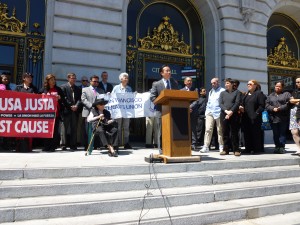TICs: Always controversial
In a TIC, a group of residents jointly owns a housing property. Owners gets their own units, but they all collectively own the building. In San Francisco, TICs have always been controversial. To homebuyers, they represent a less expensive opportunity to own a place to live in one of the most expensive cities in the world; to tenants' rights advocates, they are simply a backdoor method that erodes the city's rental stock.
Because of the cumbersome ownership structure, TICs cost 10 to 20 percent less than a comparable condo. And unlike condos, they can be financed only with adjustable rate mortgages. Just about anyone who is part of a TIC hopes to convert the building to a condo, because conversion instantly raises the value of the property and allows the owner to refinance into a fixed-rate mortgage. But because the city allows only 200 units a year to convert, it can take years before those who wish to switch over win the chance to do so in the lottery.
When condo prices soar ...
Anytime condo prices become out of reach, as they are to many right now, buyers start turning to TICs. But the current backlog in the lottery actually arose from the housing boom in the mid-2000s. Between 2002 and 2007, real estate agents sold about 2.500 TICs. Many of these buyers were erroneously told that they would be able to convert their buildings into a condo in just a few years.
Things got worse for TIC owners after the financial crisis hit in 2007. Housing values plummeted, just as interest rates on all those adjustable rate mortgages skyrocketed. That left many TIC owners underwater, unable to refinance and facing foreclosure.
Tenant Opposition to 'Bailout'
Wiener's and Farrell's proposal to let about 2,000 TICs bypass the conversion lottery was intended to help struggling owners. But to understand the tenant opposition to this "bailout," you have to look at how TICs are created in the first place.
First, the landlord has to clear out all of the tenants in the building. In the '90s, that meant evicting tenants under the highly controversial Ellis Act, which allowed landlords to kick out tenants if the landlords wanted to sell the units as a TIC. A number of the tenants protesting the current TIC legislation are those who were evicted via the Ellis Act in the '90s and early 2000s.
Since the '90s, protections have been put in place to prevent landlords from “Ellising” out tenants to sell a building as a TIC. For example, owners are penalized for evicting elderly or disabled tenants by not allowing them to condo-convert later. Still, tenants' rights advocates say landlords are using intimidation, harassment and neglect to force tenants out so that owners are free to sell. One of the most common tactics, as seen in the letter below, is to combine the offer of a buyout with the threat of an Ellis Act eviction.
The New Proposal
So, on one side you have the TIC owners who are stuck underwater on their mortgages; on the other, you have renters who are feeling the pressure to leave from landlords who want to take advantage of the hot housing market. In addition, the real estate industry has a vested interest in the fight, as it stands to make millions from selling TICs.
The new proposal grew out of intense backroom negotiations at City Hall. After hitting an impasse in talks with the real estate industry, tenants' rights advocates worked with Board of Supervisors President David Chiu to create draft amendments to the original legislation that are intended to quell the threat of real estate speculation and tenant eviction. “The basic idea is simple," Chiu said. "To ensure that as we expedite these conversions that we protect tenants by suspending the lottery for new participants for at least 10 years." The plan stipulates that the greater the number of units allowed to convert, the longer the mandated moratorium on future conversions.
Ted Gullickson, head of the San Francisco Tenants Union, said the affordable housing community decided to push for the changes after they had the support of Supervisor Norman Yee. “We saw that we had an ally,” Gullickson said. “A very important ally in the sense that he was the sixth vote on two very big concepts that were acceptable to tenants.” Aside from the temporary freeze on the lottery, the other change Gullickson cites is a law would limit future conversions to buildings with four units or fewer instead of the current six.
Yee also wants to provide incentives to affordable housing by allowing the length of the conversion moratorium to be shortened if the city creates additional affordable housing units.
